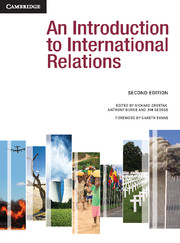Book contents
- Frontmatter
- Contents
- Tables, Figures and Boxes
- Contributors
- Preface and acknowledgements
- An Introduction to International Relations: The origins and changing agendas of a discipline
- 1 Theories of International Relations
- 2 The Traditional Agenda
- 9 The Modern State
- 10 Nations and Nationalism
- 11 Security
- 12 Arms Control
- 13 The Causes of War
- 14 The Changing Character of Warfare
- 15 The Ethics and Laws of War
- 16 International Law
- 17 International Society and European Expansion
- 18 Diplomacy
- 19 Great Powers
- 20 The Cold War
- 3 The New Agenda
- Glossary of Terms
- Bibliography
- Index
- References
14 - The Changing Character of Warfare
from 2 - The Traditional Agenda
- Frontmatter
- Contents
- Tables, Figures and Boxes
- Contributors
- Preface and acknowledgements
- An Introduction to International Relations: The origins and changing agendas of a discipline
- 1 Theories of International Relations
- 2 The Traditional Agenda
- 9 The Modern State
- 10 Nations and Nationalism
- 11 Security
- 12 Arms Control
- 13 The Causes of War
- 14 The Changing Character of Warfare
- 15 The Ethics and Laws of War
- 16 International Law
- 17 International Society and European Expansion
- 18 Diplomacy
- 19 Great Powers
- 20 The Cold War
- 3 The New Agenda
- Glossary of Terms
- Bibliography
- Index
- References
Summary
Introduction
The discipline of International Relations owes its origins to the study of war and peace. But do the wars of the early twenty-first century differ so fundamentally from their predecessors that they need to be considered in quite different ways? This chapter provides a barometer on the character of warfare and its implications for contemporary international relations. It begins with some comments on the diverse ends and means of warfare before considering five leading issues: the role of violence in warfare; the extent to which that violence is organised; the political nature of war; the interactive nature of warfare; and the scope and scale of war. The overall argument presented here is that while war today may look rather different to wars of earlier periods, much of its essential nature has remained intact. This should make us a bit sceptical about claims that the role of war in international relations has somehow been revolutionised.
The diversity of warfare
Students of International Relations need little reminding that they are traversing a discipline whose leading concepts are hotly contested. But we might be excused for supposing that the meaning and character of something as concrete as war would be an open and shut case. As this author has indicated elsewhere (Ayson 2006: 10–24) the field which looks at the place of war in international politics – strategic studies – often avoids endless debates about meaning and terminology, let alone theory.
- Type
- Chapter
- Information
- An Introduction to International Relations , pp. 199 - 217Publisher: Cambridge University PressPrint publication year: 2011

